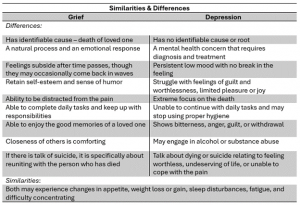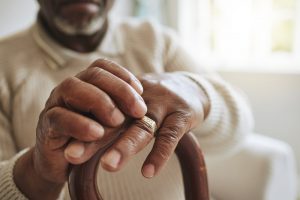After losing someone you love, you may experience a range of emotions, including sadness, confusion, disbelief, and perhaps even anxiety. But how do you know if you are experiencing normal grief or the beginnings of depression? Let’s talk about it.
What is Normal Grief?
Put simply, grief is your natural human response to the loss of someone or something you love. The emotions of grief vary greatly, but they are all normal responses to loss. As much as you may prefer not to feel or deal with these types of emotions, they are a healthy part of the grieving process.
The initial period of time just after a loss, when your emotions are unpredictable and you can’t concentrate on anything but the loss, is called acute grief. It’s the hard beginning of loss. However, in most cases, you soon move into integrated grief. This means that you have learned to accept the reality of the death, have found ways to cope and adapt to your new way of life, and have begun to hope again, finding renewed meaning and purpose in life. Moving from acute grief (initial feelings of loss) to integrated grief (a reconciliation to the loss) is a natural progression through the grief journey.
However, for some people, complications may arise, leading to either complicated grief or depression. (Click here to learn more about complicated grief.) But what is depression, how does it differ from grief, and how do you recognize it?
What is Depression?
According to the American Psychological Association, depression is “extreme sadness or despair that lasts more than days. Depression is the most common mental disorder. Fortunately, depression is treatable.”
In every source you look at, depression requires a diagnosis and does not appear to have an identifiable cause. It is a mental health concern that requires the assistance of a medical professional to diagnose and treat. This makes it quite different from grief – which is the emotional response you have to a loss – but how can you tell which is which? To help, let’s discuss symptoms to look out for with both grief and depression.
What Are the Symptoms?
To help you identify the difference between grief and depression, here’s a chart outlining similarities and differences between the two.

Who’s Susceptible to Grief & Depression?
Grief
Every person on the planet is susceptible to grief and should consider it a healthy and natural response to loss. So, if you are experiencing grief, consider it good even when it doesn’t feel like it. Experiencing grief means that you are reacting normally to a death or other significant loss in your life. When you try to shut down or shut out grief, that’s where problems can arise. Instead, by facing the emotions you feel and the circumstances before you, you can begin to process what’s happened and take back some of the control you lost following the loss.
Depression
While anyone can experience depression, there are certain factors that increase the odds. (Note: These factors do not make depression inevitable; they just make you more susceptible.)
According to the World Health Organization, these factors include a history of abuse, severe losses in life, traumatic events, genetics, certain medications, age, and even gender. Women are more likely than men to experience depression, and there’s a higher percentage of depression in adults ages 60+. Again, anyone can experience depression at any point in their life, but if you fall into any of these specific categories, make sure you are honestly evaluating yourself when difficult events arise in your life. Identifying the early stages of depression will help you address it and move forward more quickly.
Should You Seek Help?
Grief
Most of the time, when you’re dealing with normal grief, you may be able to process through it on your own or with the help of friends and family. However, you know yourself best. If it would be best for you to talk things through with a grief therapist, do it! Do what needs to be done to help you work through the loss and avoid developing complicated grief and/or depression.
To help you do the work of grief and learn how to move forward after a loss, check out these helpful resources:
- 10 Helpful Tips When Grieving a Loss
- 12 of the Best Books on Grief
- Grief & the Six Needs of Mourning
- Coping with Grief: What are Grief Triggers?
- 5 Benefits of a Grief Journal
- 7 Benefits of Joining a Grief Support Group
- 8 Ways to Express Your Grief
Depression
If you suspect (even a little bit) that you may be experiencing depression, make an appointment with your doctor. In order to treat depression, you must work closely with mental health professionals to ensure you receive the best care. Depression is not something you can treat on your own; you will need help.
Common forms of treatment for depression are:
- Psychotherapy/Talk therapy
- Antidepressant medications
- Cognitive behavioral therapy
- Interpersonal therapy
- Counseling (one-on-one or group)
Your mental health professional will work with you to try out the treatments that work best for your personality and convictions. No treatment is undertaken without your consent, so you will have a say in which methods are utilized to help you conquer depression.
In addition to seeking treatment, here are additional coping strategies you can implement:
- Stay in touch and socialize with friends and family
- Be physically active
- Face your fears; don’t avoid difficult things but work through them
- Minimize or cease alcohol consumption
- Eat a healthy, balanced diet
- Stick to a routine that encourages good habits
- Ask for help when you need it
- Limit or set boundaries on things that deepen your feelings of depression
What Can Family and Friends Do to Help?
With depression, the best option is to speak with a professional, who can act as a guide through the entire journey toward recovery.
However, family and friends can do something to help!
If you are a friend or family member, offer your full and loving support to the person dealing with depression. Be there to talk. Be encouraging. Bring small gifts or tokens of your love. Actively listen and don’t interrupt. Plan positive activities, like taking a walk or doing something they’ve always enjoyed.
The depressed person doesn’t need you to try to fix them; they need you to accept them where they are right now. Be there for them. Realize that depression is difficult for both of you and the road to recovery may be long and difficult. But it is achievable! When we do the work, we can find a way to reconcile ourselves to loss and find new hope and meaning for the future.











